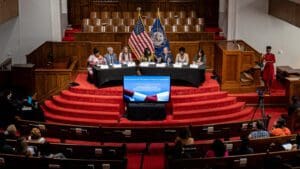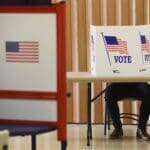Activists and lawmakers gather in Alabama to discuss the erosion of voting rights
Voting rights leaders and litigators met in Birmingham to mark the 10th anniversary of the landmark Supreme Court decision in Shelby County v. Holder, which has affected voting rights in the Deep South and beyond.

BIRMINGHAM, AL — Civil rights leaders, voting rights advocates, and litigators from around the country convened at the historic 16th Street Baptist Church in Birmingham, Alabama, Wednesday to begin planning a path forward in the fight for a fair and equal right to vote.
The symposium was hosted by the Subcommittee on Elections of the House Committee on the House Administration and led by its ranking member, Alabama Rep. Terri Sewell. It commemorated the 10th anniversary of the U.S. Supreme Court’s 2013 decision in Shelby County v. Holder, which eliminated two sections of the landmark 1965 Voting Rights Act and erased preclearance, the requirement that specified jurisdictions that had a history of restricting voting rights clear any changes to their election procedures or processes with the federal government before making them.
Sewell told the American Independent Foundation that the decision to hold the discussion at the 16th Street Baptist Church was meaningful to her as both a Selma native and the first Black congresswoman to represent Alabama. She said: “For the House Administration Committee, the Subcommittee on Elections to host this symposium … in such hallowed ground as the 16th Street Baptist Church, where four little girls gave their life so that the Civil Rights Act of 1964 would have life and ultimately pass — it’s never lost on me that I get to walk the halls of Congress as Alabama’s first Black congresswoman because four Black girls couldn’t.”
Just before 11:00 a.m. on Sept. 15, 1963, a bomb exploded in the church, killing four Black girls attending Sunday school and injuring 20 other congregants. The four suspects in the bombing were all members of the Ku Klux Klan. No charges were brought against them at the time.
The bombing eventually galvanized the Civil Rights Movement and spurred the passage of the 1964 Civil Rights Act.
Top of mind at the symposium was the recent 5-4 Supreme Court ruling in Allen v. Milligan on June 8, which agreed that the Republican-controlled Legislature had drawn a congressional map that discriminated against Alabama’s Black voters and violated section 2 of the Voting Rights Act.
One in four voters in Alabama is Black, but there is only one Black congressional seat in seven districts in the state. The ruling means a new congressional map will have to be drawn and an additional majority-minority district created.
“The opportunity for Alabama to have a decision that upholds the effectiveness of Section 2 of the Voting Rights Act in the Milligan case was befitting,” Sewell said. “After all, Alabama brought us the Voting Rights Act of 1965, John Lewis was bludgeoned on a bridge for that sacred right for every American to vote.”
Sewell added, “Alabama will be the first, but not the last of the states across this nation that will change their maps or be asked to change their maps, forced to change their maps because of the Supreme Court decision.”.
Nevertheless, she said, it was still necessary to restore preclearance to the Voting Rights Act. That would mean that any changes to voting laws can’t be enforced until approved by a three-judge panel in federal court or by the U.S. attorney general.
“Having the opportunity on the front end to stop legislation that is discriminatory from being enacted by preclearance is a powerful way that the federal oversight of state legislatures can ensure no voter discrimination,” Sewell said.
Evan Milligan, the executive director of Alabama Forward and a plaintiff in Allen v. Milligan, told the panel that his mother had lived through segregation in Montgomery as a child and that her experience informed his ideas about voter suppression.
“When we’re talking about voting, we’re talking about public space, and voting is one component of how we regulate public space. And it’s going to be something that will inform what you do for the rest of your lives,” Milligan said during the panel discussion.
“When people have so much fervor about attacking the Voting Rights Act, it’s informed by a story that started even before desegregation, but it certainly started then. We began to devalue public space after integration. And so that has continued to devaluing democracy, devaluing freedom,” Milligan said.
Sewell is the author of the John R. Lewis Voting Rights Advancement Act. This September, she will introduce the act in the House for the second time. If passed, it would shore up the full power of the Voting Rights Act, reinstating the sections removed by the Shelby decision.
The legislation, named after the late Georgia congressman, was killed in 2022 by a filibuster in the Republican-controlled Senate.
When the American Independent Foundation asked Tona Boyd, associate director-counsel with the NAACP Legal Defense Fund, about the filibuster, she said, “Regardless of the way the Senate decides to govern itself, we’re going to continue to push for the passage of critical voting rights laws that we know are sacred and are critical to upholding our democracy.”
She added: “In the same way that John Lewis fought in the face of such incredible, incredible barriers and in the face of violence, frankly, to truly found our democracy, and get the passage of the Voting Rights Act initially, we will continue that fight, and who knows what’s possible?”
Former Alabama Democratic U.S. Sen. Doug Jones called the filibuster a major obstacle.
Jones, who in the late 1990s and early 2000s, as U.S. attorney for the U.S. District Court for the Northern District of Alabama, obtained the convictions of two of the bombers of the 16th Street Baptist Church, said during the panel discussion:
It’s been used by segregationist senators for years and years and years. There is no regular order in the Senate. When I got to the Senate, and I worked in the Senate in 1979 and ’80 when they actually had regular order, and they would debate, and you did not see filibusters very often. And when you did, it was because they were spending time together to try to carve out a compromise, an exception. Now it’s just a deal killer. You vote, and it’s gone. And I think that there are some things that need to be done. I really strongly advocated, at a minimum, a carve-out for voting rights.
Maya Wiley, president and CEO of the Leadership Conference on Civil and Human Rights, told the American Independent Foundation that the same states working to enact restrictions on abortion care are working to suppress voters.
“We have about half the country of states working to protect the right to vote, make sure people have access to the ballot, make sure people have bans off their bodies. We have another roughly half the country that is making it harder to vote, and they’re the same states that are actually organizing bans on people’s bodies, even criminalizing the help for people to get reproductive health care,” Wiley said:
When we look at the dots of where and how voter restrictions, voter access, and lying actually about whether there’s voter fraud, those are in the same states that are using the power they’re consolidating for particular viewpoints to make sure that they can pass laws that even a majority of their citizenry does not support. … So the connection is, if we can’t get our access to the ballot, particularly for all the women who are low-income, who are in rural areas, who are Native American, who are Latina, who are Black, they’re having trouble voting, they’re not able to vote to protect their health care, their bodily autonomy and their futures.
Published with permission of The American Independent Foundation.
Recommended

Democrats regain full control of state House with two special election wins
In special elections on Tuesday, state House Democratic candidates Peter Herzberg and Mai Xiong scored victories in two Southeast Michigan districts to help secure a 56-54 voting majority for their caucus.
By Ken Coleman, Michigan Advance - April 17, 2024
Youngkin blocks Democratic bills dealing with elections
Vetoes affect ranked choice voting and voting rights lawsuits
By Graham Moomaw, Virginia Mercury - April 11, 2024
Hovde ad blaming migrants for resource drain uses non-American actors
Hovde has made border security a centerpiece of his campaign despite campaigning against a bipartisan border security bill.
By Jesse Valentine - April 09, 2024







































































